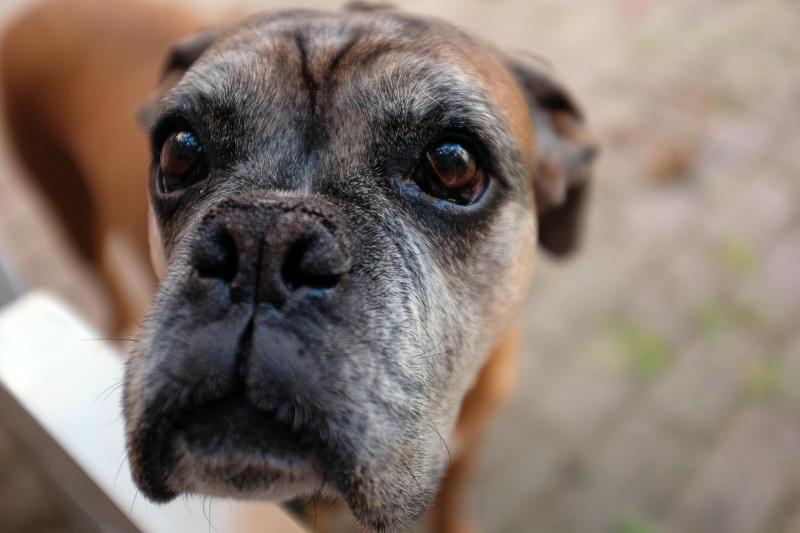Dementia and Senility in Dogs
 Just like humans, dogs can also become senile and develop dementia, affecting their memory, learning, and comprehension. Although dementia can affect any breed, it is most commonly observed in small dogs.
Just like humans, dogs can also become senile and develop dementia, affecting their memory, learning, and comprehension. Although dementia can affect any breed, it is most commonly observed in small dogs.
Dogs affected by dementia gradually start to behave differently and can become confused, irritable, and disorientated. They may be more restless at night, sleep more in the day, and forget commands.
Sadly, dementia is progressive and is not curable, but there are things you can do to slow its progression and ease symptoms. Read on to discover the symptoms, diagnosis, and treatment of canine dementia and senility.
Symptoms
As your dog gets older, you may notice behaviour and changes that point to neurological problems. Dogs affected by dementia may display symptoms such as disorientation, confusion, increased anxiety, disrupted sleep patterns, loss of housetraining, decreased interaction, and changes in appetite.
A behavioural checklist, which is given the acronym DISHAAL, can be used to help identify dementia in dogs:
- D for disorientation – gets stuck, difficulty getting around, stares blankly, gets lost in familiar places, less reactive to visual or auditory stimuli
- I for interactions – decreased interest in approaching people, not wanting affection as much, more irritable, fearful, or aggressive
- S for sleep/wake cycle – sleeping more during the day, being restless, barking, or whining during the night
- H for house-soiling – going to the toilet indoors, not signalling that they want to go out
- A for activity – decreased exploration or play, increased pacing or wandering, repetitive behaviours such as circling, chewing, or licking
- A for anxiety – increased separation anxiety, more reactive or fearful, increased fear of places and locations
- L for learning and memory – less able to learn commands or tasks, not responding to commands, increased distraction, decreased focus
Symptoms are progressive, which means that they get worse over time. The sooner dementia is diagnosed, the more effective treatments will be in easing symptoms and slowing down progression. If your dog is exhibiting symptoms of dementia or senility, they should be seen by a veterinarian as soon as possible.
Diagnosis
There is not a definitive test for canine dementia, but veterinarians can perform an examination and a variety of tests to either identify or rule out other medical reasons for any changes in behaviour.
If the veterinarian rules out other health conditions, they may determine that your dog has dementia, in which case, they will recommend treatment options. A diagnosis can be difficult to handle, but it is important to acknowledge that dogs can continue to live happy, healthy lives with dementia, providing they are given the proper care and attention.
Treatment
Although dementia is incurable, medication, exercise, supplements, and consistent routines can slow its progression and help to manage symptoms and keep your dog happy and healthy for as long as possible.
Your veterinarian may prescribe medicine such as selegiline hydrochloride which increases antioxidant activity and decreases free radical formation. This can help to improve your dog’s sleep-wake cycle, toilet training, and activity levels.
Older dogs can benefit from diets or supplements containing antioxidants, omega-3 fatty acids, medium-chain triglycerides (MCTs), vitamins, and amino acids. Trials show that these can have a positive effect on a dog’s dementia-related symptoms.
Ensuring your dog has places where they can rest undisturbed, taking them for short walks, providing enrichment, and ensuring they have a bedtime routine which includes going outside to the toilet, can help them to settle at night.
If your dog is soiling in the house, accompany your dog outside regularly, and lay down puppy training pads around your home in spots where they tend to go to the toilet to make cleaning up a bit easier.
Use hand signals and simplify commands to make it easier for your dog to understand what you are asking of them. Give them treats to encourage and reward them.
Dogs with dementia can be more aggressive than usual, and are also more likely to become targets of aggression from other dogs. So, it is important to monitor your dog when they are with other dogs or people, even if they are familiar with them.
Ensure that your dog is able to get around the home easily and with as few obstructions as possible. Get down to their eye level and consider how they get around, then move furnishings around to make things easier for your dog. Monitor them after making changes to ensure they are not struggling to adjust to the changes.
If you are going away, it is a good idea to get a pet sitter who will look after your dog in your own home. Sending a dog with dementia to a place which they are not familiar with can be really unsettling for them.
For help with adjusting to life with a dog with dementia and managing their behavioural changes, our expert team at WitsEnd are on hand, offering tailored advice, training sessions, and behaviour therapy.
Working with people from all over the country, we have had over 2000 success stories! To book an appointment or for more information, please call us on 0116 244 2455.